"A man ought to read just as inclination leads him, for what he reads as a task will do him little good."—Samuel Johnson
| Reviews | Limericks | Six Words | Buy Nothing |
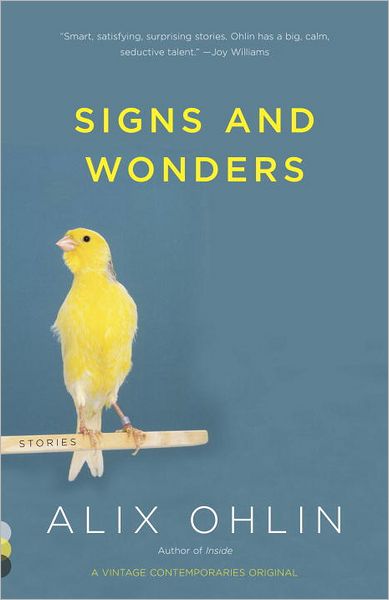 23 September 2012
23 September 2012
Signs and Wonders
Alix Ohlin
I read so many short stories in the 1990s that I thought I'd burnt out on them. These days, those that can hold my interest are usually weird, like Rivka Galchen's or Ben Loory's. Yet Ohlin's collection can't really be called weird, treading as it does the familiar ground of middle-class life and loss. She writes of marriage, children, grief, and death, of educated women in their thirties and men who offer them their charm but little else. It somehow feels very fresh without feeling very different.
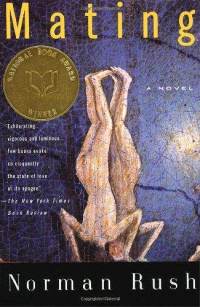 23 September 2012
23 September 2012
Mating
Norman Rush
This novel about an anthropologist pursuing a development guru across the Kalahari desert is like nothing else I've ever read. Rush's heroine is a steel coil, strong yet jittery, and the object of her crush is her mental and physical match, a man of remarkable accomplishments who talks of life's goal being to reduce the amount of time required to decently maintain oneself so that you can have all the time you want for reading. I have never in one book encountered so many words I didn't know, and without a working knowledge of Latin I doubt I caught half the references in their wordplay, yet this book was funny nonetheless, and a pleasure to read. They banter, and bicker (the narrator compares marriage to two parties trying different wrestling holds on each other until one of them gets tired and goes limp) and they try to create something beautiful against the backdrop of an unforgiving climate and the apartheid regime in Southern Africa, which, in the early 1980s, is rotting, but not quickly enough. Like any great novel it's all about understanding people, whether they are Batswana or Westerners. As the heroine says, "I want to know the rules, because there are always rules. People who tell you there aren't tend to be hiding their knowledge of the rules for their own advantage."
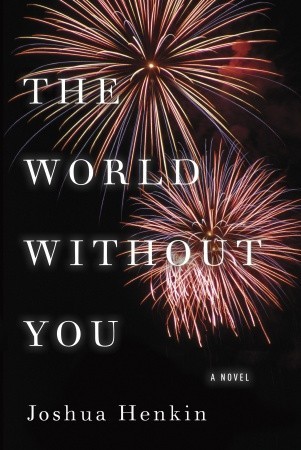 18 July 2012
18 July 2012
The World Without You
Joshua Henkin
I checked out this book because I read somewhere that it's the sort of classic novel they don't write anymore. Unfortunately, it's the sort of novel they write all too often. Henkin's characters feel like characters rather than people, and it's almost impossible to keep track of who is speaking because they all have the same smart-aleck voice. What sets this book apart is that it seems to take place in a parallel universe, where logic and the laws of physics don't apply and where the inhabitants attempt to exhibit convincing human behavior but fail badly. I don't have the space to list the many examples of baffling questions asked in the middle of conversations or of flat-out contradictions, not all of which are explained by poor editing. When the reader is asked too many times to believe something impossible (a character jams dental floss into her gums and blood drips into the sink; a man recalls changing a baby's diaper with his feet) she loses her trust in the writer, who either doesn't live in our world or just isn't paying attention. This is a writer who seems to be trying to keep his work interesting by grabbing words out of the thesaurus rather than working to find the right ones (a slightly built, elderly woman walking through a house "ferries herself" past the refrigerator and "traffics" into the hallway). The setup is that a family is gathering for a weird combination of a tombstone unveiling and a party, in memory of the brother, a journalist who was killed in Iraq. Henkin doesn't bother to make the brother anything but an adored saint, a guy who as a college student bought sandwiches for a crowd of homeless men, in yet another story lacking a ring of truth. He does insert as many anti-Bush jabs as he can, which, for his audience, will hardly be challenging, much less relevant. It's an easy read, one I enjoyed mainly for the bizarre exchanges and physical impossibilities.
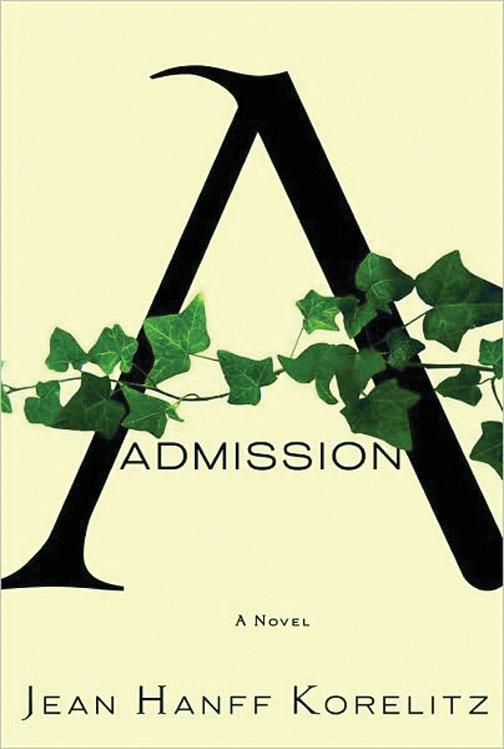 18 July 2012
18 July 2012
Admission
Jean Hanff Korelitz
I found this novel on my public library's "popular library" shelf, which is a small collection of classics, contemporary fiction and narrative nonfiction, in trade paperback form, generally of reliably good quality. It's the same place I discovered Lauren Fox, who, like Korelitz, I hadn't heard of before I picked up her book, and, as with Fox, I now intend to read everything she ever writes. Korelitz, like her protagonist, worked as an admissions officer for Princeton, and clearly gave a lot of thought to her job. She uses her protagonist, Portia, as a mouthpiece for her thoughts on how, contrary to popular impression, the admissions process at top-tier universities is an equalizing force rather than a perpetuation of elitism. Portia is given to long and quite interesting speeches on the topic. As observant and opinionated as she is about her work, Portia is strangely lacking in self-awareness when it comes to her own life. She has a secret, which is revealed gradually, a complicated relationship with her mother, and a charming love interest. It's a pleasure to read a book with an academic setting that deals with adult problems unrelated to the battle for tenure. Korelitz has a knack for capturing how real people live in the modern world, and that, combined with the unfolding mystery and the informative inside look at college admissions, makes for a wonderful novel.
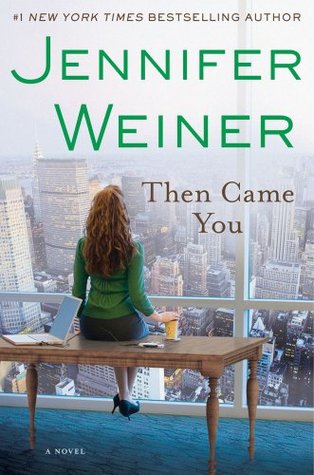 18 July 2012
18 July 2012
Then Came You
Jennifer Weiner
Authors: If you use the title of a pop song as the title of your novel (are you listening, Wally Lamb?), you must keep in mind that the reader is going to get that song stuck in her head every time she picks up your book. Jennifer Weiner chose well, intentionally or not, with the title of Dionne Warwick's 1974 hit with the Spinners. And the book itself is yet another pleasant Jennifer Weiner read, clicking along satisfyingly with a pause in the action every so often to describe in detail what everyone is wearing. Infertility brings together four women from different walks of life, each playing a role in the exchange of money for reproduction. Weiner seems to be trying to make each character sympathetic in her own way, except when she's using them to make mean girl comments about one of the others. It's the snobs versus the slobs. Something I noticed: As in the novel Commencement, the pretty, proper Caucasian college girl who never thought of herself as a lesbian falls for an Asian woman. Coincidence, or does the woman's being Asian make her unthreatening?
Also by Weiner: Good in Bed and Best Friends Forever
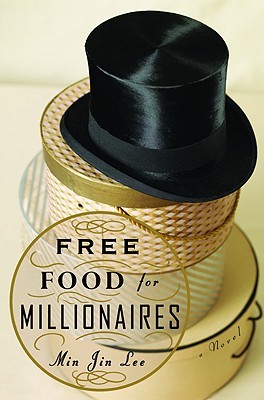 18 July 2012
18 July 2012
Free Food for Millionaires
Min Jin Lee
By chance, this is the third book I read in a row (see the two above) that features Princeton University. First-generation Korean American Casey Han is floundering after her graduation from Princeton. Why can't Casey support herself? Is it that she is too stubborn to accept help? Is it the common modern problem of talented young people given too many choices and lacking direction? Is it that all good things come only to those who don't need them (see the title)? Is it just that it's 1993 in New York City, the lull before the dot com boom? Actually, after following Casey around for 600 pages, the answer seems to be simple: she has tastes that far exceed her means and no money management skills. The novel reminds me of Maugham in its matter-of-fact storytelling, its lack of judgment about its characters, and its musing on the subjects of money and love. This long novel also has plenty of room for Casey's friend Ella, the beautiful and dutiful Korean daughter; Casey's mother, an old woman at 43 toiling at her dry-cleaning business; and Casey's benefactor, Sabine, the wildly successful and imperious hatmaker and businesswoman, as well as a flurry of weddings, affairs, and divorces. Lee seems to tire a bit around page 400, but by then you'll be well hooked.
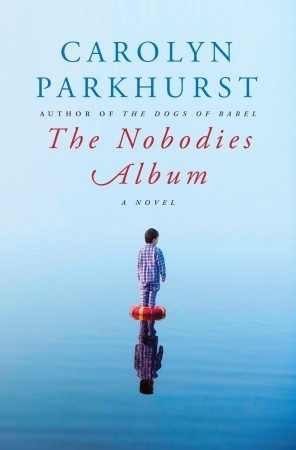 25 June 2012
25 June 2012
The Nobodies Album
Caroline Parkhurst
A novelist is estranged from her rock-star son, but when she finds out he's the suspect in his girlfriend's murder she's compelled to try to figure out who committed the crime, as much to solve the puzzle as to come to the aid of her son. As she proceeds to investigate and to repair the broken relationship, she weaves in rewritten final chapters of her own novels. As neither gimmicks nor murders are my thing (fictional murders, that is; I do like a good true crime story), that I enjoyed this book says a lot about the writer's storytelling skills.
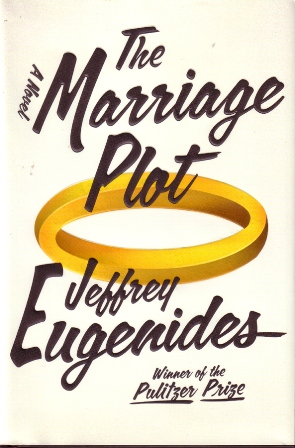 12 May 2012
12 May 2012
The Marriage Plot
Jeffrey Eugenides
The heroine is writing her thesis at Brown about how 19th century novels are all about who a woman will marry. Which is what this book is about. Which means it's really about the men in question, the alpha, a a mentally ill scientist, and the beta, a religious seeker. Immensely readable, but after it's done you realize you've just read Marjorie Morningstar, set in the 1980s.
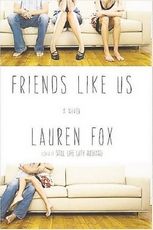
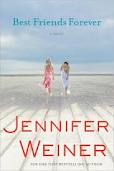 12 May 2012
12 May 2012
Friends Like Us
Lauren Fox and
Best Friends Forever
Jennifer Weiner
A single, physically awkward, vaguely Jewish woman in her mid/late-twenties lives in the Upper Midwest and makes whimsical art.
She has a complicated relationship with her best girlfriend since childhood, is distant from her parents, and has one sibling, a brother,
to whom she is devoted even though he hasn't always been nice to her. The plot is set in motion by her high school reunion.
So far, this describes both books. Which to read? It depends on how you feel about happy endings.
If you want to read home-decor descriptions that are more decadent than most sex scenes and you enjoy a story where,
like in the author's earlier work, a heroine perseveres despite the world's mild disapproval, choose Jennifer Weiner.
If you have a high tolerance for Lorrie Moore–style punnery and appreciate a story where, like in the author's earlier work, a woman wrecks a relationship and doesn't get forgiven for it, choose Lauren Fox.
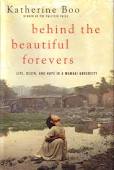 12 May 2012
12 May 2012
Behind the Beautiful Forevers: Life, Death and Hope in a Mumbai Undercity
Katherine Boo
The author immersed herself in the lives of the residents of a slum outside Mumbai. She follows the story of a one-legged woman who sets herself on fire out of resentment for her garbage-dealing neighbors' relative success. The book, which reads like a novel, makes clear that being poor makes people take out their frustration on other poor people, which should come as no surprise. As with Random Family, the reader can't help but wonder how the author could watch these terrible things happen in these people's lives, and what the point of the book is, however elegant the writing.
More about India: Sideways on a Scooter
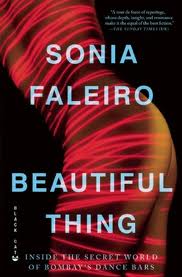 12 May 2012
12 May 2012
Beautiful Thing: Inside the Secret World of Bombay's Dance Bars
Sonia Faleiro
Another look at the impact of sexism and lack of education on Indian lives, but with a lot more cash, which doesn't make things any better. Not nearly as beautifully written as Boo's book (see above), but this author is a presence in her book and her subjects' lives, spending time with the dancers and following their stories as they try to wrest themselves free of "the life," though they have few other options.
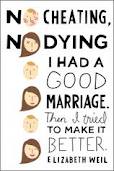 12 May 2012
12 May 2012
No Cheating, No Dying: I Had a Good Marriage. Then I Tried to Make It Better
Elizabeth Weil
The author and her husband have been married more than ten years, have two kids, and work together as writers in their home office, which means they frequently spend 22.5 hours a day in each other's company, and they still make up reasons to run errands with each other. And they have sex every other day. Clearly, theirs is about the last marriage in America that needs any improving and this book is just a way to fund the completion of their home renovation so they can finally have a door on their master bedroom bathroom (something that, by the way, only a very happily married couple could get along without for any length of time). But Weil is a good writer, and who doesn't like a peek inside someone else's marriage? A chance to ponder: what would I do if my spouse butchered a lamb in the kitchen, or hated kissing, or forced me to dump a friend that he didn't like? It works for them, and most of us should be so lucky.
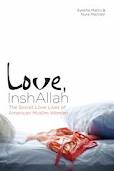 12 May 2012
12 May 2012
Love, Inshallah
edited by Ayesha Mattu and Nura Maznavi
Muslim women—traditional and modern, gay and straight, converts and Muslim-born, older and younger, single and married (sometimes in polygynous marriages)—write with honesty and candor about their love lives. Many write under pseudonyms, and several, particularly those struggling to reconcile their religion and their homosexuality, despair of finding happiness.
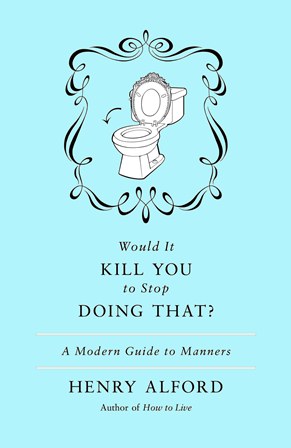 12 May 2012
12 May 2012
Would It Kill You to Stop Doing That? A Modern Guide to Manners
Henry Alford
Many people like to share their opinions on manners, and not all are as witty as Alford, but few have such spectacularly bad judgment. He shares his passion for a game called "touch the waiter" where he and his dining companions try to touch their server without being noticed. He advocates chastising strangers who fail to yield the right of way on the sidewalk. He takes seriously a woman who flies off the handle at her coworker for not texting her a congratulatory message after the birth of her baby. And he advises a man who has a one-night stand with a closeted guy who blows him off to write the closeted guy an angry letter. Modern manners have much room for improvement, but this might be the rare guide that makes them worse.
"There was so much to read, for one thing, and so much fine health to be pulled down out of the young breathgiving air...I was rather literary in college—one year I wrote a series of very solemn and obvious editorials for the Yale News—and now I was going to bring back all such things into my life and become again that most limited of all specialists, the 'well-rounded man.' This isn't just an epigram—life is much more successfully looked at from a single window, after all."—F. Scott Fitzgerald, The Great Gatsby
Copyright © 1996–2026 So Much to Read
Contact: books at so much to read dot com